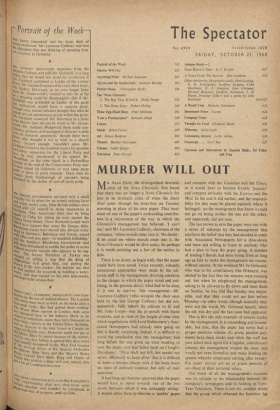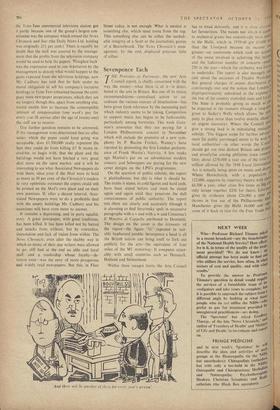MURDER WILL OUT
MR. ALAN DENT, the distinguished dramatic critic of the News Chronicle, first learnt that there was no longer a News Chronicle for him to be dramatic critic of when the Daily Mail came through his letter-box on Tuesday morning in place of his own paper. That treat- ment of one of the paper's outstanding contribu- tors is a microcosm of the way in which the Chronicle's management has behaved. '1 can't see,' said Mr. Laurence Cadbury, chairman of the company, 'where morals enter into it.' No doubt : if he could see where morals enter into it, the News Chronicle would be alive today. So perhaps it is worth pointing out a few of the entries to him.
There is no doubt, to begin with, that the paper could have been saved. Twice recently, virtually unanimous approaches were made by the edi- torial staff to the management, drawing attention to the danger in which the paper stood and out- lining, in the greatest detail, what had to be done if it was to survive. The management—Mr. Laurence Cadbury (who occupies the chair once held by the late George Cadbury but did not, apparently, fully inherit his attitude to it) and Mr. John Coope—met the proposals with bland evasions, and in view of the length of time over which negotiations with Lord Rothermere's Asso- ciated Newspapers had already been going on this is hardly surprising. Indeed, it is difficult to avoid the conclusion that the management had long before the end given up even wanting to save the paper. and had fallen back on Clough's Decalogue : 'Thou shalt not kill, but needst not strive, officiously to keep alive.' But it is difficult to make a murder charge stick if the body bears no signs of outward violence, but only of mal- nutrition.
It had long ago become apparent that the paper would have to move towards one of the two stools between which it was unhappily sitting: it would either have to become a 'quality' paper and compete with the Guardian and the Times, or it would have to become frankly 'popular' and compete seriously with the. Express and the Mail. In the end it did neither, and the responsi- bility for this must be placed squarely where it belonged: on the management that knew it could not go on being neither the one nor the other, and apparently did not care.
The last moves to save the paper were met with a series of sidesteps by the management that reinforce the belief that they had decided to settle with Associated Newspapers for a close-down and were not willing to listen to anybody who had a plan to keep the paper going. A number of leading Liberals had been trying from as long ago as July to make the management see reason, without success. At the weekend Mr. Jo Grimond, who was in his constituency (the Orkneys), was alerted to the fact that the minutes were running out; but when he telephoned the management, asking to be allowed to fly down and meet them on Sunday, he was told that Sunday was impos- sible, and that they could not see him before "Monday—in other words (though naturally they were not the words Mr. Grimond heard), when the ink was dry and the last issue had appeared.
Nor is this the only example of evasive tactics by the management. It is astonishing and lament- able, but true, that the paper has never had a proper pensions scheme. Ex gratia pension pay-
ments have been made, and when the staff last year asked once again for a regular, contributory
scheme, the management evaded the issue, and would not even formalise and make binding the system whereby employees retiring after twenty- five years' service got an ex gratia pension of ono-third of their terminal salary.
Uut worst of all the management's evasions was its attitude to the relationship between the
company's newspapers and its holding in Tyne- Tees Television. There is not the smallest doubt that the group which obtained the franchise for the Tyne-Tees commercial television station got it partly because one of the group's largest con- stituents was the company which owned the News Chronicle and Star (the Daily News Ltd. holding was originally 211 per cent.). There is equally no doubt that the stall was assured by the manage- ment that the profits from the television company would be used to help the papers. Ploughed back' was the expression used to one deputation by the management to denote what would happen to the gains expected from the television holdings; now Mr. Cadbury has said that he feels under no moral obligation to sell his company's lucrative holdings in Tyne-Tees (obtained because the com- pany were newspaper proprietors, which they are no longer), though this, apart from anything else, would enable him to increase the contemptible amount of compensation (one week's pay for every year 8f service after the age of twenty-one) the staff are to receive.
One further question remains to be answered. If the management were determined that no offer under which the paper could keep going was acceptable, does £1,500,000 really represent the best they could do from killing it? It seems in- credible, to begin with, that the plant and the buildings would not have fetched a very great deal more on the open market, and it will be interesting to see what Associated Newspapers do with them, since even if the Mail were to hold as many as 50 per cent. of the Chronicle's readers (a very optimistic estimate) the copies could still be printed on the Mail's own plant and on their own premises. If. after a decent interval, Asso- ciated Newspapers were to do a profitable deal with the empty buildings Mr. Cadbury and his associates will have even more to answer.
It remains a depressing, and in parts squalid, story. A great newspaper, with great traditions, has been killed. It has been killed not by hatred and attacks from without, but by cowardice, irresolution and lack of vision from within. The News Chronicle, even after the shabby way in which so many of their star writers were allowed to go. still had at the end an able and loyal staff. and a readership whose loyalty—de- votion even—was the envy of more prosperous and widely read newspapers. But this, in Fleet Street today, is not enough. What is needed is something else, which must come from the top. This something else can be either the unshak- able integrity of a Scott or the journalistic genius of a Beaverbrook. The News Chronicle's man- agement, by the end, displayed precious little of either.



















































 Previous page
Previous page